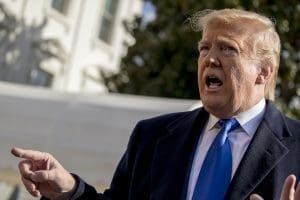Trump aims to cut health funds despite vow to 'safeguard' US from new virus
Donald Trump’s proposed budget calls for cutting funding to the World Health Organization in the midst of the deadly coronavirus outbreak.

Donald Trump’s new budget proposes cutting $3 billion from global health programs, despite his repeated vows to protect Americans from the deadly new virus outbreak.
According to Foreign Policy, Trump is specifically proposing a 50% reduction in funding for the World Health Organization, the main global body fighting to contain the coronavirus outbreak, which first began in China.
Such cuts “are entirely out of touch with the threats facing our nation,” Adm. James Stavridis and Gen. Tony Zinni, co-chairs of the U.S. Global Leadership Coalition’s National Security Advisory Council, said in a statement Monday, after Trump’s proposal was released.
They added that foreign assistance “is not charity but a strategic investment in our own security that saves lives and keeps us safe.”
Trump’s proposed cuts directly contradict his previous pledges to protect Americans from the growing outbreak, which started in December and has spread to dozens of countries. More than 1,000 people have died in China alone as a result of the outbreak.
“My administration will take all necessary steps to safeguard our citizens from this threat,” Trump said about the new virus during his Feb. 4 State of the Union address.
Later, on Feb. 7, Trump told reporters that the Centers for Disease Control and Prevention, a U.S. federal agency, was working closely with the World Health Organization and China to address the outbreak, which he called “a tough situation.”
“[China is] working really hard, and I think they are doing a very professional job,” he said. “They’re in touch with the World Organization [sic] and CDC also. We’re working together.”
Trump’s budget notably calls for a 9% cut to CDC funding.
According to Foreign Policy, Trump administration officials have defended the proposed $3 billion in cuts by pointing out that the administration is also calling for an additional $15 million in funding for the USAID Global Health Security Program, which is aimed at fighting diseases like the new coronavirus.
However, the totality of the cuts is concerning to foreign policy and global health experts.
Trump’s budget “is a waste of the paper it’s printed on,” rep. Eliot Engel, chair of the House Foreign Affairs Committee, said in a statement, adding that if it were enacted, it would “weaken our security and leadership around the world.”
The budget is “woefully out of touch when it comes to protecting America’s interests,” Liz Schrayer, president and CEO of the U.S. Global Leadership Coalition, said in a separate statement. “Given the growing threats from the coronavirus to the rise of China and other great powers … now is not the time to take our diplomats and development tools off the playing field.”
On Tuesday, Director-General Tedros Adhanom Ghebreyesus, the head of the WHO, called the new coronavirus “a very grave threat,” noting the virus “does not respect borders or ideologies.”
In a call with reporters a day earlier, he had warned, “This is a common enemy that we can only defeat if we do it in unison and in unity.”
Published with permission of The American Independent Foundation.
Recommended

Ohio doctors fear effects of emergency abortion care case set to go before U.S. Supreme Court
A federal law that allows emergency departments to treat patients without regard to their ability to pay will be under U.S. Supreme Court scrutiny this week, and Ohio doctors are concerned about the case’s local impact on emergency abortion care.
By Susan Tebben, Ohio Capital Journal - April 23, 2024
House GOP votes to end flu, whooping cough vaccine rules for foster and adoptive families
A bill to eliminate flu and whooping cough vaccine requirements for adoptive and foster families caring for babies and medically fragile kids is heading to the governor’s desk.
By Anita Wadhwani, Tennessee Lookout - March 26, 2024
U.S. House Speaker Johnson says IVF should be protected — just not by Congress
U.S. House Speaker Mike Johnson said Thursday that it’s up to states and not Congress to preserve access to in vitro fertilization, weighing in on a growing national debate and campaign issue.
By Jennifer Shutt, States Newsroom - March 14, 2024








































































